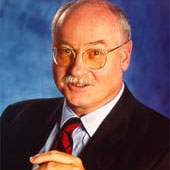How the EU Really Works
Does the EU facilitate domestic politics in Europe?
June 21, 2004
Europe has been more successful than many would believe in taking courageous political steps and undertaking reforms in recent years — much more so than many originally expected.
The creation of the European Monetary Union, the eastern enlargement of the Union, the new European constitution are all huge projects. To my knowledge, they are larger than anything accomplished on a regional level anywhere in the world in this period.
In addition, there were important deregulations — for example — in the telecommunication sector from which consumers profit. In all fairness, however, it must be added that there are also areas — such as agricultural policy and the growth of bureaucracy — in which developments were more disappointing.
Despite what critics say, Europe on the whole is anything but an impediment to reform. On the contrary, it is an engine for change. The key question is a different one: Why has so much been achieved at the EU level — and so little at the national level?
This is even more perplexing, since experience has shown that reforms in larger communities are more difficult to implement than in small ones. Surely, there are many explanations for this.
One reason is that national governments in democratic societies must always try to establish a balance of interests between winners and losers of a reform policy.
Unfortunately, this balance usually ends with the lowest common denominator, in other words no action at all — or only a minimalist solution.
Only very extraordinary leaders in extraordinary times have so far succeeded in overcoming these mechanisms (Ronald Reagan in the United States, Margaret Thatcher in Great Britain, Ingvar Carlson in Sweden).
The mechanisms which paralyze winners and losers also exist at the European level. The introduction of the euro, for example, would never have been possible in Germany by democratic means, such as a referendum.
Europe’s great advantage, however, is that winners and losers are often in different countries. The balance between them must not be worked out in a difficult democratic process. Rather, this is done through foreign policy negotiations, which are conducted according to an entirely different set of rules.
In addition, it is easier to come to a compromise between 25 foreign ministers than in a society of 450 million people.
The introduction of the euro and the demise of the deutschmark was the price which the Germans had to pay for the French consent to German reunification.
Reform policy in Europe is therefore not domestic policy with all the dark sides of conflicts between various social groups. It is foreign policy, which "rises above" these things.
This is the big advantage in Europe — and the reason why there is greater scope for taking action on that level. Of course, the downside is a lack of democracy, which ultimately cannot be accepted.
In addition, the EU often is unjustly blamed for many of these reforms that are necessary — and could not be agreed upon at the national level. This or that measure must be taken, so the argument goes, because partners in the community insist on it.
And the “whipping boy” who gets blamed frequently is naturally not especially popular with people. This explains the many complaints about aloofness and excessive bureaucracy in Brussels.
This leads to a truly perplexing finding: The more democracy and integration in Europe progress, the more the EU loses its advantage of having greater scope for action in terms of reform policy.
When European policy mutates from foreign policy to domestic policy — and this is the declared goal — the mechanisms which operate in individual nations will come into play. Anybody who is seen to use Europe — meaning Brussels — as an engine for reform must get moving very soon.
It is interesting that Europe can afford reforms although lobbyism in Brussels is much more marked than in national capitals. It is always said that lobbyists either prevent reforms or accept them only in favor of producers, not consumers.
In fact, despite the lobbyists, Brussels has pushed through more consumer-friendly and competition-promoting reforms than many national governments. Lobbyism does not appear to be such a strong brake on reforms. More serious are the associations, which apparently are not yet so strongly organized at the European level.
The conclusion is straight forward: Europe's leaders should use the EU’s greater ability to undertake reforms as long as it exists — the faster the better. There is a big agenda here for growth policy which must be worked through. Remember the Lisbon Process, which was agreed upon in 2000 with the goal of making the Union one of the most competitive knowledge societies in the world by the end of the decade. Little of this agenda has been implemented so far.
As I see it, this is the most important community project after adopting the European Constitution. Without more economic growth, Europe will not be able to maintain its appeal for its citizens, its weight in the world — and the role of the euro in the markets. Stagnation — or even disintegration — would be the result.
Read previous
Larry Summers’ New Worldview
June 16, 2004
